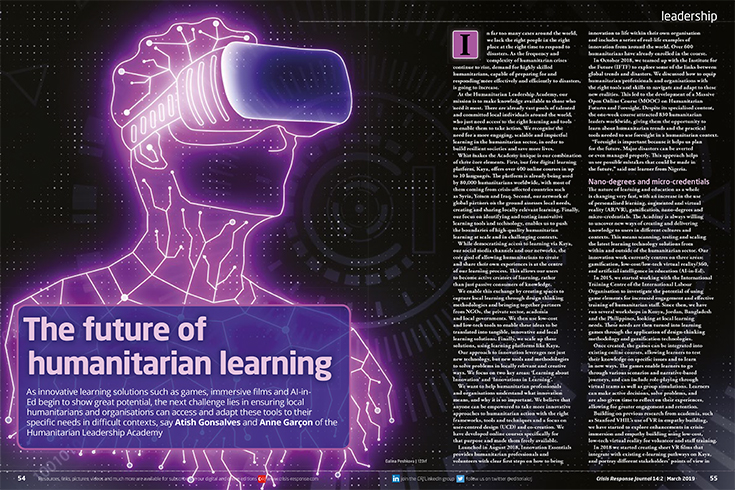Massive online open course in humanitarian essentials looks at risks, security and wellbeing
Distance and online education change as quickly as the technology, pedagogy and adult education that support such learning morphs from one system to the next, writes Robert Fagan.

In issue 14:2 of the Crisis Response Journal, Atish Gonsalves and Anne Garçon of the Humanitarian Leadership Academy, outline how games, immersive films and AI in Education show great potential for humanitarian organisations (available to subscribers only, see below)
Massive Open Online Courses (MOOCs) are online courses aimed at unlimited participation and open access via the web. We’re starting to see more and more of these courses in the response and emergency management communities. International humanitarians in the disaster assistance and response fields are a perfect population to take advantage of such offerings needing just in time training available globally. Starting soon, those new to the humanitarian operating environment should take advantage of the course entitled, Humanitarian Essentials MOOC: Risks, Security and Well-Being.
This MOOC will focus on two specific topics important for all of us: operating safely and securely at all times and managing in a pressured and changing environment. The course will start April 1, 2019, and continue through almost the entire month as a four-week offering. The Humanitarian Leadership Academy (see CRJ 14:2 for article by Atish Gonsalves and Anne Garçon, available to subscribers only) has teamed up with the UK’s International Location Safety and the United Nation’s International Training Centre’s Turin campus in Italy to bring you this course.
Week One will discuss minimising the risks in a crisis. Week Two will focus on managing personal safety and security. Week Three helps us learn to manage and cope while Week Four will demonstrate how to manage professionalism.
I’m really looking forward to this course because I believe it will be organised well in its modular format, with each week building upon the previous one. Additionally, each week has the same components in terms of sections on exploring, reflecting, sharing and learning more. With hundreds of potential students, I’m sure we will gain a great deal from the global reflections submitted.
Although lasting four weeks, don’t be deterred by the length of the course. It advertises 1.5 to three hours per week of study, reading, and participation time.
This course should be taken by anyone in our field who wishes to review operational risk management in a hazardous environment. It appears that the course will have plenty of inward analysis on what it means to work in difficult areas and thinking through not only the mechanics of staying safe, but the psychological resilience components as well.
Registration is simple through the Humanitarian Leadership Academy Once registered you’ll be glad you did because the Humanitarian Leadership Academy is consolidating more and more international humanitarian relief effort courses on its platform making it the go to one stop shopping area for such courses and certifications in this field. Good luck and ‘see you’ online!
Train today; live tomorrow!
Robert Fagan, 20/03/2019